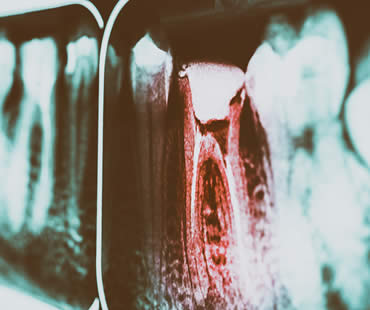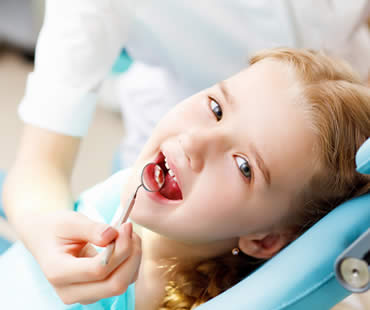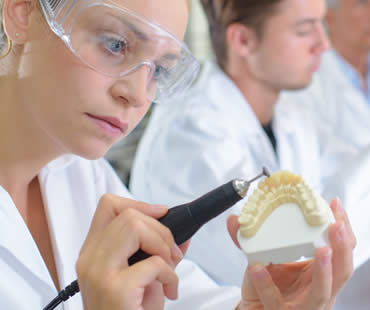
Severely damaged, injured or diseased teeth can lead to not only cosmetic problems with your smile, but also functional ones. Your dentist may recommend dental crowns or dental bridges to treat your dental issues.
Dental crowns are a restorative dental therapy that covers the affected tooth completely, serving as the new outer surface of the tooth. A dental crown maintains the natural roots of a tooth and can prevent extraction. A dental bridge fills the gap left by one or more missing teeth and is affixed to bordering teeth with an anchoring crown.
Both dental crowns and dental bridges are made from a variety of materials that can be designed to match the color of your surrounding natural teeth. As opposed to removable prosthodontics such as full or partial dentures, dental crowns and bridges are permanently bonded to existing teeth or dental implants, allowing them to function and appear as natural teeth.
Dental crowns and bridges have a number of advantages and benefits, such as:
- Dental crowns protect the natural tooth after a root canal therapy, helping to prevent bacteria re-infecting the tooth that could lead to extraction.
- Dental bridges restore gapped or missing teeth, providing support to the surrounding teeth, preventing them from shifting in to fill the empty space and affecting your speech, bite and smile.
- Your dentist can typically place dental crowns and bridges in as few as two appointments.
- Dental crowns and bridges are both long-lasting, durable therapies, designed to protect your natural tooth for years to come.
- Dental crowns prevent bone loss by preserving the natural tooth roots, thereby stimulating the jawbone, preventing resorption, or shrinkage, of the bone following extraction.
If you have questions about what a dental crown or bridge can do to improve the form and function of your smile, talk to your dental professional today. You can restore your healthy smile and preserve it for years to come with a dental crown or dental bridge treatment.
We look forward to seeing you in our Fernandina Beach dental office

Some people have the wrong idea that taking their children to the dentist isn’t that important, and that it’s really a healthcare choice for adulthood. Young teeth are vulnerable to bacteria that lead to cavities and gum disease, so teaching your kids how to practice good dental hygiene is a must. However, it’s just as important to get into the habit of taking your kids for regular checkups at the dentist.
Does it matter which dentist we choose?:
Sometimes the hardest part about the whole process is talking your child into seeing a dentist. Many kids are afraid of the dentist, even if it’s just the idea of an unknown experience. Then once they go to the dentist and see all the unfamiliar and sometimes noisy equipment, you can be in for an uphill battle. That’s why it’s important to choose a dentist who is experienced in treating kids and equipped for their unique needs. Select a dental office that strives to make kids comfortable and helps them through the process. You may even want to consider a pediatric dentist, who specializes only in treating kids.
What can we expect at a checkup?:
The goal of a dental visit is to clean and protect your child’s teeth, and to prevent and treat diseases or other problems. The dentist will start with an examination and X-rays if needed, in order to get a better view of your child’s oral health. The appointment will also include a teeth cleaning, which provides a much more thorough and deep cleaning than your child is able to perform at home. If there are any problems diagnosed, treatment procedures will be discussed and you can decide with the dentist how to proceed.
Schedule your appointment at our Fernandina Beach dental office

Millions of root canal treatments are performed every year, and it is an effective and safe way to save a damaged tooth. Unlike its reputation over the years, modern dentistry allows this procedure to be practically painless and to provide relief from symptoms right away.
Anatomy
The first thing to understand is the anatomy of the tooth. Under the hard enamel on the outside of the tooth and the dentin below that, the interior of a tooth contains pulp. It houses the nerves, blood vessels, and connective tissues that all nourish the tooth. This allows it to grow properly and contributes to good oral health. After the tooth is fully developed, the tooth can get its nourishment from surrounding tissues and the pulp is not as necessary.
Necessity
The pulp can become infected, inflamed, or damaged by problems like decay, injury, repeated dental procedures, or a bad crown. If the damaged pulp is not treated, an abscess can develop or severe pain can result. Often, root canal treatment is the only way to save the tooth instead of having to extract it. Dentists advise that saving a tooth is almost always a better option, providing the most natural appearance, efficient function, and protection of oral health.
Procedure
Many patients report that root canal treatment is not much different for them than having a regular filling done. X-rays are taken and a local anesthetic is administered. Once numb, a dental dam is placed to protect the area during the procedure. Then the pulp is removed, the area is thoroughly cleaned, and then it is filled with special material for this purpose. The tooth is sealed for protection, and finally a crown is placed on top to protect the tooth. Most patients are able to return to normal activities immediately following treatment, and the procedure is permanent in most cases.
If you need a root canal dentist in Fernandina Beach, contact our office today.

The desire for a beautiful, healthy, natural smile is universal. Dental procedures such as root canal treatments aren’t something people aspire to have, and there are things you can do personally that can reduce your risk of having a root canal procedure.
Prevention is the best step you can take to avoid root canal therapy, and it all begins with you at home. If you didn’t grow up with good oral hygiene habits, now is the time to develop them. This simple step can lead directly to good oral health. Be sure you are brushing your teeth at least twice a day, following each meal if possible, and absolutely before sleeping. If you don’t brush your teeth before bedtime, you’re providing a robust breeding ground for bacteria to grow and degrade your teeth while you’re sleeping. Floss daily to reach the places between teeth and beneath the gum line that brushing can’t reach.
Fluoride in your toothpaste and in mouthwash can keep your tooth enamel strong and durable. Never give fluoridated toothpastes to children under the age of two years and avoid fluoridated mouthwash until the child is more than six years old.
Maintaining a proper diet ensures that your body is receiving all of the nutrients it needs for health, both orally and elsewhere in the body. Chewing crunchy foods like raw vegetables and hard fruits can help keep your teeth bright and clean, scraping away debris while you chew.
If you are a smoker, you should stop immediately. Not only is it a huge factor in your oral health, but also for your overall health. Smoking contributes directly to lung disease, cancer and heart disease, as well as other health issues. Your dentist or doctor can give you excellent advice about quitting.
Stay hydrated by drinking lots of water and avoiding sugared drinks. Rinse your mouth after consuming soda, coffee, tea or a sports drink.
Be sure to see your dentist twice a year for regular check-ups and cleanings, and keep your risk of a root canal treatment low.
Our dental office is located in Fernandina Beach

Finding the right dentist is an important decision because it’s a healthcare relationship that can last a lifetime. The need for dental care starts around age one and continues through senior adulthood. For routine dental care, you might choose to see a family dentist or a general dentist. Although there are some similarities, the two types of dentists have some unique aspects.
Services:
Both types of dentists offer routine services that are common to oral health care. This includes examinations, cleanings, x-rays, and fluoride treatments. Instructing patients about dental hygiene such as proper brushing and flossing is part of most family and general dentistry practices as well. Poor oral care can cause decay, infections, gum disease, or other problems. Both types of dentists also offer treatment for when problems arise, such as dental fillings.
Patients:
General dentists often cater to patients in a certain age range, but family dentists provide treatment for patients of all ages. Infants, children, adolescents, adults, and seniors are all able to seek oral health care from a family dentist. Each age group has unique needs and issues, but family dentists are skilled in caring for everyone.
Specializations:
Since they see all ages of patients, family dentists are skilled in a wide variety of procedures. They are able to diagnose and treat many oral health conditions, including gum disease and oral cancer. Typical procedures they offer include tooth extractions, root canals, fillings, crowns, bridges, and sealants. Some are able to perform specialty services like implants and veneers. Many patients enjoy being able to obtain treatment from their family dentist without having to see a specialist.
Benefits:
In addition to the benefit of getting a variety of treatments in one location, family dentists are also able to provide ongoing treatment for all household members. Children and parents go to the same location and can even request back-to-back appointments. Everyone learns the same dental care techniques that they can practice at home together. Family dentists encourage every member of the family to take pride in their oral health.
We treat patients from Fernandina Beach and the surrounding area

Dentures have been around a long time as a way to restore smiles plagued by missing teeth. They provide a solution for people who want to smile, talk, and eat as normally as possible. Unfortunately, removable dentures aren’t without issues. They can become loose or shift, making it uncomfortable to eat and talk. Messy denture adhesives are bothersome and ineffective for some patients. Therefore, advancements in dental technology have developed the option of permanent dentures.
What are permanent dentures?
Permanent, or fixed, dentures are suitable for patients missing one, two, or more teeth. The appliance is made up of a row of crowns or artificial teeth, which are connected together and the framework is supported by dental implants. The implants act like natural tooth roots, and the permanent dentures create a bite similar to natural teeth.
What are the benefits?
Fixed dentures definitely offers some advantages to removable ones. The need for messy adhesives is eliminated, and you don’t have to worry about loose or ill-fitting dentures affecting you. The force of your bite is also improved, so you can eat all kinds of foods without concern. Because a permanent upper denture doesn’t cover the roof of your mouth, your ability to taste and enjoy food is not sacrificed. This kind of denture stays in place for normal oral hygiene, so there are no special cleaning or soaking requirements. If properly maintained, permanent dentures can last for many years or even a lifetime.
Are there any disadvantages?
Permanent dentures are susceptible to oral problems like infection or inflammation because they are not removable. Also, it is possible that the crowns may require replacement in 10 to 15 years.
We treat patients from Fernandina Beach and the surrounding area







